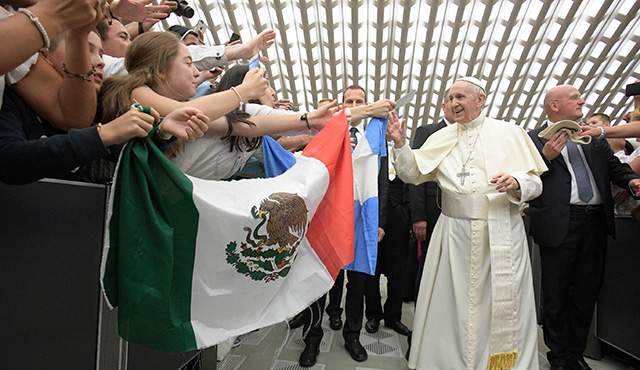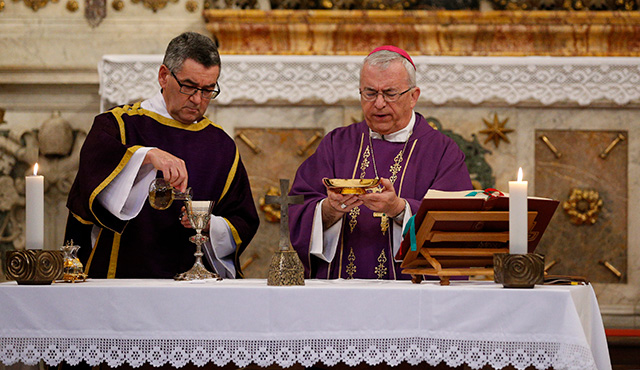Often it is the converts to Catholicism that make the best Catholic apologists. Most “cradle” Catholics’ religious education consists of elementary instruction and ends at the sacrament of Confirmation. Adult converts have the good fortune to learn the “grownup” version of Catholicism, and have more opportunity to delve into the rich theology and rationale for the many tenets of our faith and our sacred traditions. A convert is much more likely to know the answer to why Catholics do certain things, because they wondered the same thing, and could get answers during the RCIA process.
According to Kevin Orlin Johnson, PhD and author of Why Do Catholics Do That?, “In America today, a lot of people seem to be kept away from the Church on the basis of externals alone; much of the Church’s liturgy – the Church’s public ceremonial acts of worship – her art and her practices must appear uncomfortably foreign to them. But if you talk with them about religion, sometimes you’d think that they wouldn’t disagree on any basic tenet of the Faith at all.”
The fundamentals of Church teaching are summarized in the Nicene Creed, which was produced from the Council of Nicaea in 325 A.D. The Emperor Constantine, a convert, called the Council. He wanted to settle the feuds erupting throughout the empire over the many heresies that were cropping up, most importantly the Arian Heresy, which postulated that while Jesus Christ was the Son of God, he was not eternal and therefore subordinate to God the Father. The Nicene Creed expresses the fundamentals of Christian belief and is recited at every Mass.
The Liturgy of the Eucharist, the Mass, is probably one of the most misunderstood aspects of Catholic belief. It is the heart of what makes the Church, founded by Christ, the repository of the “fullness of faith” – in other words, the Christian churches that have spun off the Catholic Church carry varying degrees of Christian theology, but the whole truth of Christ and his Church rest with the successors of Peter.
The term “Catholic Church”, referring to the Christian church founded by Jesus and first headed by Peter the apostle, dates to about the year 110 AD. In a letter from St. Ignatius to the Smyrnaeans, “Wheresoever the bishop shall appear, there let the people be, even as where Jesus may be, there is the Catholic Church.” This was written only about 75 years after the crucifixion. As Johnson observes, “St. Augustine thought it’s called (Catholic) because she ‘truly embraces the whole of Christ’s truth, some particles of which may be found even in the various heresies.’ Today the term is used to distinguish the Church from separate sects but it isn’t part of her name. She’s just the Church with a capital C.”
The Liturgy of the Mass or Eucharist is celebrating the core of Catholic belief. Unlike Protestant services that generally include hymns and a sermon, the Mass is the fulfillment of Christ’s call at the last supper to “Do this in remembrance of me.” Through the Mass, the bread and wine are transubstantiated into the body and blood of the risen Christ. “It’s sort of the opposite of transformation, in which the substance of something stays the same but the appearance changes,” says Johnson. “Transubstantiation means the appearance stays the same but the substance is changed, as Jesus said at the Last Supper, the last Passover meal that he celebrated with his apostles.”
Anyone who has visited a Jewish Shabbat service will notice striking similarities to the Mass. And for good reason, the last supper was the Jewish ceremonial meal therefore the Mass is the fulfillment of the Jewish tradition and beliefs. Johnson explains, “The apostles and their successors stuck firmly with the liturgy that Christ established at the last supper – you can’t really compromise with a directive like ‘Do This’ ¬– and on this foundation, they framed the Mass.”
For Catholics who were raised in the Church, our traditions and customs seen through adult eyes may require some upgrades to our faith formation. Many parishes offer courses for returning Catholics, and retreats such as Cursillo offer an excellent refresher on the basics of Catholic teaching practice. Catholic apologetics is exploding with books, videos, e-mail subscriptions and podcasts that are easy to understand and theologically sound. Publishers such as Ignatius Press, Sophia Institute Press, Loyola Press and many others offer material on every aspect of Catholic teaching. Finally, radio and cable television have a growing number of stations that focus on Catholic living from a variety of perspectives, including Relevant Radio which is broadcast to the Los Angeles market from studios at Christ Cathedral on AM 930.
It is worth taking the time to take a fresh look at your Church. Especially if you have questions or feel confused or even irritated by some aspect of Church teaching or tradition. As Archbishop Fulton J. Sheen, one of the greatest Catholic apologists of our time, said, “There are not one hundred people in the United States who hate The Catholic Church, but there are millions who hate what they wrongly perceive the Catholic Church to be.”
The Catholic Church is the only Christian church that is 2,000 years old. It was founded by Jesus to be your support and guide through life until you are reunited with him in heaven. It’s worth taking a deeper look.


